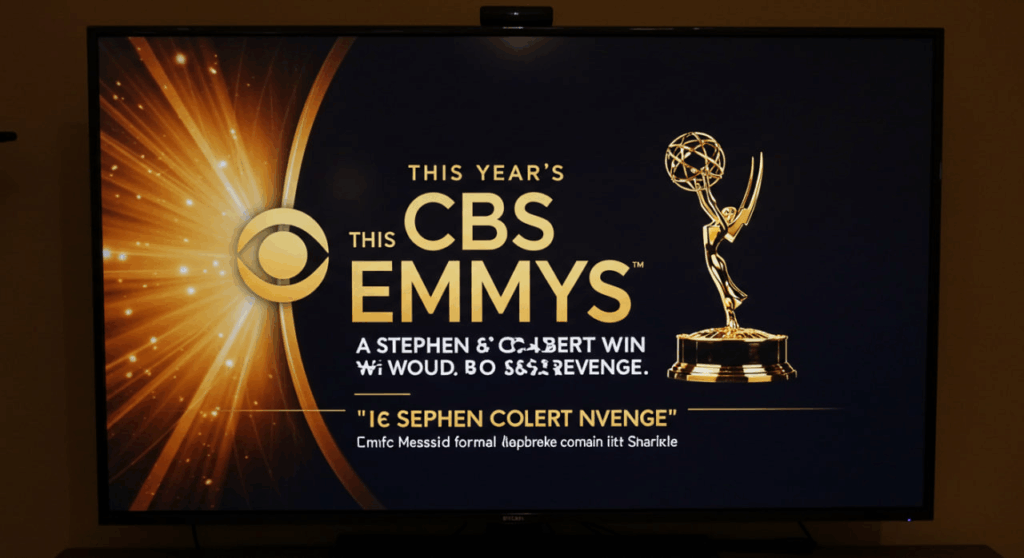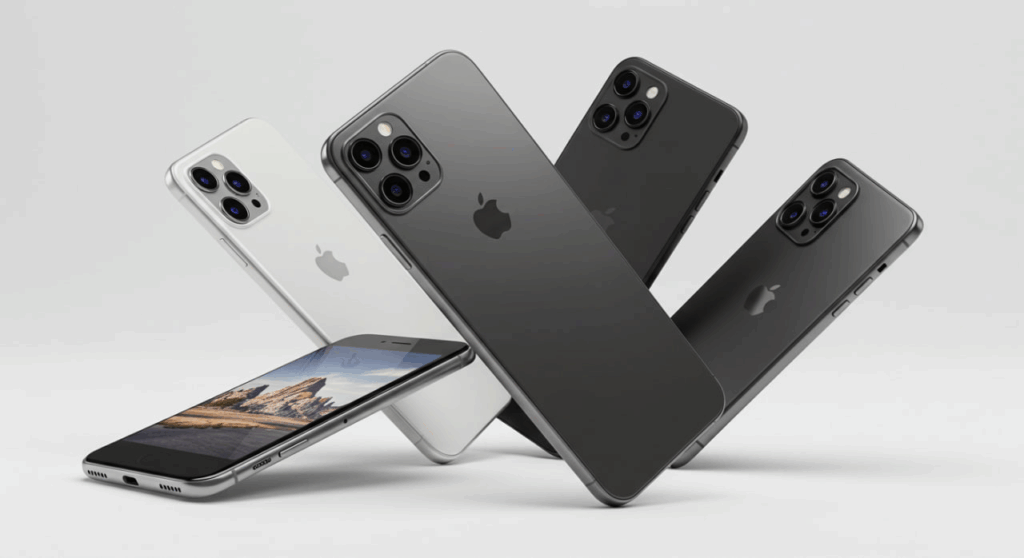The 77th Primetime Emmy Awards, set to air on September 14, 2025, on CBS, are shaping up to be more than just a celebration of television excellence. This year, the spotlight is on Stephen Colbert and his show, The Late Show with Stephen Colbert, which has been nominated for Outstanding Talk Series. With CBS’s controversial decision to cancel Colbert’s top-rated late-night show in May 2026, a potential Emmy win carries a deeper significance—a moment of poetic justice for a comedian who has redefined late-night television. In this article, we’ll dive into why a Colbert victory would be a triumph, explore the technological and cultural shifts impacting late-night TV, and review the broader context of the Emmys in 2025, all while reflecting on the industry’s evolving landscape.
The Rise and Resilience of Stephen Colbert
From Comedy Central to CBS: A Legacy of Innovation
Stephen Colbert’s journey in late-night television is a masterclass in adaptability and wit. Starting as a correspondent on The Daily Show with Jon Stewart, Colbert carved out a niche with his razor-sharp political satire. His creation, The Colbert Report on Comedy Central, was a groundbreaking parody of conservative punditry, earning him multiple Emmys and a loyal fanbase. When he took over The Late Show from David Letterman in 2015, expectations were sky-high. Initially, Colbert struggled to find his voice, moving away from the exaggerated persona of his Report days to a more authentic, politically engaged style. By 2016, as political tensions in the U.S. intensified, Colbert found his stride, blending incisive humor with empathetic interviews, making The Late Show the No. 1 late-night program for nine consecutive seasons. This resilience in the face of a changing media landscape showcases why Colbert remains a titan in television.
The Cancellation Bombshell: A Financial or Political Move?
In July 2025, CBS dropped a bombshell: The Late Show with Stephen Colbert would end in May 2026, marking the end of a 33-year franchise. The network cited financial reasons, pointing to a 50% drop in late-night ad revenue from $439 million in 2018 to $220 million in 2024, as reported by Variety. Producing a high-budget show like The Late Show, with its large staff and elaborate sets, became increasingly unsustainable as audiences shifted to streaming platforms and social media clips. However, the timing raised eyebrows. Just days before the announcement, Colbert sharply criticized CBS’s parent company, Paramount, for settling a $16 million lawsuit with President Donald Trump over a 60 Minutes interview. This led to speculation, fueled by posts on X and industry analyses, that the cancellation might be a strategic move to appease the Trump administration amid Paramount’s merger with Skydance Media, which requires FCC approval. Whether driven by dollars or politics, the decision has positioned Colbert as an underdog, making an Emmy win a potential act of defiance.
The Tech Transformation of Late-Night Television
Streaming and Social Media: The New Battleground

The television industry has undergone a seismic shift, driven by technological advancements that have reshaped how audiences consume content. Late-night shows like The Late Show face unique challenges in this digital era. Unlike scripted dramas or comedies, topical talk shows have a short shelf life, making them less viable for streaming platforms like Netflix or Hulu. However, Colbert has leveraged technology to stay relevant. His monologues and celebrity interviews often go viral on platforms like YouTube and X, where short, shareable clips reach millions. Despite this digital success, CBS struggles to monetize these views, as social media platforms don’t directly translate into ad revenue for the network. This disconnect highlights a broader industry trend: traditional broadcast models are crumbling under the weight of digital disruption, forcing networks to rethink their strategies.
The Role of AI and Data in Modern TV Production
Behind the scenes, technology plays a pivotal role in shaping modern television, including late-night shows. Networks like CBS use advanced analytics to track viewership trends and ad performance, informing decisions like the cancellation of The Late Show. AI-driven tools are increasingly used to optimize content distribution, such as tailoring YouTube clips to specific audiences or analyzing social media sentiment to gauge a show’s cultural impact. For instance, Colbert’s team likely uses data to identify which segments—like his biting political commentary or heartfelt interviews—resonate most with viewers. However, over-reliance on AI-generated content or automated strategies can backfire, as Google’s Helpful Content Update emphasizes human-crafted, high-quality content over algorithm-driven fluff. For bloggers aiming for AdSense approval, this underscores the importance of original, engaging content that prioritizes user experience, much like Colbert’s authentic approach to storytelling.
Why an Emmy Win Would Be Sweet Revenge
A Cultural and Symbolic Victory
A Stephen Colbert Emmy win in 2025 would be more than an award—it would be a statement. The Late Show has been nominated 33 times since 2015 but has yet to win the Outstanding Talk Series category, often overshadowed by shows like Last Week Tonight with John Oliver or The Daily Show. The 2025 Emmys, airing on CBS, present a unique opportunity for voters to honor Colbert’s contributions, especially in light of the cancellation controversy. As noted in a Los Angeles Times column, a win would create “delicious live theater,” with Colbert potentially addressing the cancellation and Paramount’s actions on stage. This moment could resonate with viewers who see Colbert as a voice of reason in a polarized media landscape, making the victory a symbolic middle finger to those who doubted his staying power.
The Competition: A Crowded Field
The 2025 Emmy race for Outstanding Talk Series is fiercely competitive, with contenders like Jimmy Kimmel Live!, The Daily Show, and YouTube’s Hot Ones vying for the prize. Hot Ones, hosted by Sean Evans, represents the new wave of digital-first content, while The Daily Show carries its own legacy of satire. Colbert’s advantage lies in his ability to blend humor with emotional depth, a hallmark of his interviews with guests like Michelle Obama or his poignant monologues on social issues. The sympathy factor, amplified by Trump’s gloating on Truth Social about the cancellation, could sway Emmy voters, as suggested by industry experts on X. A win would not only validate Colbert’s decade-long run but also highlight the enduring value of broadcast television in an era dominated by streaming.
Crafting Content for AdSense Success: Lessons from Colbert
Prioritizing Quality and Engagement

For bloggers seeking Google AdSense approval, The Late Show offers valuable lessons in creating high-quality, user-focused content. Google’s E-A-T (Expertise, Authoritativeness, Trustworthiness) guidelines emphasize original content that provides value to readers. Colbert’s show excels by offering insightful commentary, backed by a team of expert writers and producers, and delivering it in an engaging, accessible format. Bloggers should emulate this by writing detailed, well-researched articles that address reader needs—whether it’s a tech review or an informational piece—while avoiding clickbait or thin content. For example, instead of generic product lists, include personal insights, data-driven comparisons, and clear methodologies, as advised by Housefresh.com.
User Experience: Design and Accessibility
A good user experience is critical for AdSense approval and audience retention. The Late Show’s sleek production, from its revamped Ed Sullivan Theater to its polished digital clips, ensures viewers stay engaged. Bloggers should focus on clean website design, fast loading times, and mobile optimization. Avoid overloading pages with ads, as Google penalizes sites that prioritize monetization over usability. Incorporate clear headings (like the H2/H3/H4 structure here), concise paragraphs, and interactive elements like FAQs to enhance navigation. By mirroring Colbert’s commitment to quality and accessibility, bloggers can build trust with both readers and Google’s algorithms.
Conclusion: A Moment for Colbert to Shine
The 2025 Emmys on CBS could be Stephen Colbert’s swan song, a chance to cement his legacy with a long-overdue win. His cancellation, whether driven by financial woes or political pressures, has sparked a conversation about the future of late-night television and the role of technology in shaping media. For bloggers, Colbert’s story is a reminder to create content that resonates authentically with audiences, leveraging expertise and engagement to stand out in a crowded digital landscape. As we await the Emmys, one thing is clear: a Colbert victory would be a fitting tribute to a comedian who has entertained, informed, and challenged us for decades.
FAQ
Why was The Late Show with Stephen Colbert canceled?
CBS announced that The Late Show will end in May 2026 due to financial challenges, citing a significant decline in late-night ad revenue. Some speculate political motivations tied to Paramount’s merger with Skydance Media, though CBS denies this.
What makes Stephen Colbert’s show unique?
Colbert blends sharp political satire with empathetic interviews, creating a distinctive voice in late-night TV. His ability to adapt to digital platforms while maintaining broadcast quality has kept The Late Show No. 1 in its slot.
How can bloggers improve their chances of Google AdSense approval?
Focus on high-quality, original content that aligns with Google’s E-A-T guidelines. Ensure a user-friendly website with fast load times, mobile optimization, and minimal intrusive ads. Include detailed, well-researched articles with clear value for readers.
Who are the main competitors for the 2025 Emmy for Outstanding Talk Series?
Competitors include Jimmy Kimmel Live!, The Daily Show, and YouTube’s Hot Ones. Each brings a unique flavor, but Colbert’s blend of humor and cultural commentary gives him a strong edge.
How does technology impact late-night television?
Streaming platforms and social media have shifted audiences away from traditional TV, reducing ad revenue. Shows like The Late Show rely on viral clips and data analytics to stay relevant, but monetizing digital views remains a challenge.



